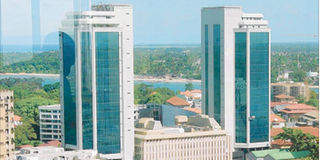BoT clarifies fall of country’s import capacity

The Bank of Tanzania headquarters in Dar es Salaam. PHOTO|FILE
What you need to know:
- The IMF report shows that the import power decreased to 3.6 months in June this year, down from 4.1 months in November last year.
- Going by BoT Monthly Economic Review, Tanzania’s forex reserves had gone down from $4 billion (about Sh8.6 trillion) to $3.5 billion (about Sh7.5 trillion).
Dar es Salaam. The Bank of Tanzania (BoT) has faulted a report by International Monetary Fund (IMF) that the country’s import capacity has dwindled from 4 to 3.6 months due to falling foreign exchange reserves.
The IMF report shows that the import power decreased to 3.6 months in June this year, down from 4.1 months in November last year.
Going by BoT Monthly Economic Review, Tanzania’s forex reserves had gone down from $4 billion (about Sh8.6 trillion) to $3.5 billion (about Sh7.5 trillion).
But the BoT governor , Prof Benno Ndulu, criticised IMF report on the grounds that its measurement unit did not reflect the country’s import capacity.
“IMF measures our purchasing power using net international reserves as opposed to gross international reserve that is used for measuring imports,” noted Prof Ndulu in an interview yesterday.
“The reserve, which we currently have, is enough for the country to import goods and commodities for four months and two weeks,” he elaborated.
This clarification by Prof Ndulu follows a worry expressed by the ACT-Wazalendo party leader Zitto Kabwe about the IMF’s report on the matter in question. Mr Zitto noted that the situation was a manifest of worrying trend as with the fall in oil prices and high exports during the period [June], forex reserves were not supposed to shrink.
“Something wrong might be going on in our foreign reserve. I guess the government is either withdrawing some money from the reserve to protect our shilling or the money has been directed into something else,” he noted.
A University of Dar es Salaam economics lecturer, Dr Jehovaness Aikaeli, said the fall in reserves had adverse impact to the country in terms of importation. But he faulted Mr Kabwe on the argument that foreign reserves were supposed to rise due to fall in oil price and high exports during the period.
“It’s not true that the level of exports during the period would determine the level of foreign reserve,” Mr Aikaeli said, adding that its impact would be seen in future and not by the time exportation was made.


